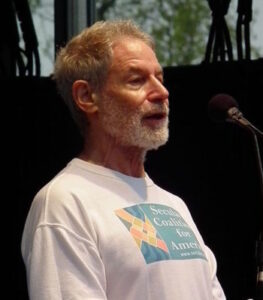An Interview with Herb Silverman
Canadian journalist Scott Jacobsen interviewed prominent humanist, secular advocate, and Humanist magazine columnist Herb Silverman to gain insight on contemporary secular issues. Their discussion is transcribed here.
Scott Douglas Jacobsen: It’s been a hot minute since last talking virtually. However, since I was travelling all over the States, I did get the opportunity to, in fact, meet in person, Sharon [Herb’s wife] and you. That was lovely, so thank you: for showing me Charleston, having a meal, taking a walk, and just being hospitable. Do you get a lot of visitors?
Dr. Herb Silverman: It was a pleasure to see you, Scott. Now you understand why Charleston is the top tourist attraction in the US. There are many lovely sites. And it’s also where the “War of Northern Aggression” (Civil War) started.
Jacobsen: How has it been living in Charleston, South Carolina as one its most prominent long-term atheists?
Silverman: Over time and as the “nones” (those with no particular religion) have slowly increased, the need for open atheists here is no longer as crucial. Many Northerners have moved to Charleston, so it has become a purple city in a red state, which makes it easier. And we have a thriving secular humanist group in Charleston for social support.
Jacobsen: Now, to the point of this interview, what is the overarching tone of secularism in the United States now?
Silverman: I think it is “on the fence”. Atheism is not the dirty word it used to be, and the fastest growing demographic is the “Nones.” However, white Christian nationalists are achieving their legislative goals in too many states, just consider the abortion restraints they’ve accomplished.
Jacobsen: What do you see as the major setback in the United States for church and state separation?
Silverman: I know “church and state separation” is a popular expression, but I never use it. I refer to “separation of religion and government” to show we include synagogues, mosques, and all theistic religions. The major setback here is that too many Christian nationalists believe we are a Christian country, and they are a serious threat to separation of religion and government.
Jacobsen: How is the Secular Coalition for America?
Silverman: SCA is doing very well. I helped found the organization in 2004 with just four national member organizations. SCA now has twenty national atheist, humanist, and other nonreligious member organizations, including of course, the American Humanist Association.
The Secular Coalition has a dedicated lobbying organization within the Coalition, with a mission to advocate for the equal rights of nonreligious Americans and defend the separation of religion and government. Representing twenty national member organizations, hundreds of local secular communities, and working with our allies in the faith community, SCA combines the power of grassroots activism with professional lobbying to make an impact on the laws and policies that govern separation of religion and government. Furthermore, the Secular Coalition takes every opportunity to support the Congressional Freethought Caucus, which currently has twenty-three members of the House of Representatives.
Jacobsen: What do you see as the important points to target theocratic creep in American politics?
Silverman: We need to take every opportunity to alert our members to what theists are doing, and speak out to counter some of their activities. Publicity about this problem is essential. The Secular Coalition for America has an important advocacy campaign.
Jacobsen: You have been the target of anti-Semitism and anti-atheist discrimination. What are some of the stories around those?
Silverman: Since I am a godless Jew, I have been called a self-hating Jew. Not true. I’m proud to be a Jew (someone who had Jewish parents). Although I am an atheist, even Orthodox Jews consider me a Jew (though not a very good one). Adolph Hitler considered me a Jew, and some of my family members died in the Holocaust. I would not want to give Hitler a posthumous victory by denying my Judaism. In the past, I have had signs put on my office door saying, “Atheist Shithead.” I prefer the expression I learned in elementary school: “Sticks and stones may break me bones, but words will never hurt me.” Fortunately, nobody broke my bones because of being a Jewish atheist and humanist.
Jacobsen: What can younger generations of Jewish atheists (etc.) and others learn from moving forward and not taking the discrimination and racism personally?
Silverman: They can try to make a positive difference, and ignore or respond in a reasonable fashion to personal insults.
Jacobsen: Are there efforts to catalogue anti-None prejudice and bias in national and state statistics in a manner similar to anti-Muslim, anti-Semitic, etc., bigotry is catalogued, e.g., hate crimes?
Silverman: I agree that this is important. I don’t have specific information on who is doing it, and hope readers will tell us what they know.
Jacobsen: How can people get involved in the Secular Coalition for America, whether volunteering time, money, or skills and expertise, to combat violations of secular equality?
Silverman: They can do all of the above. Check the website secular.org.
Jacobsen: Thank you for the opportunity and your time, Herb.
Silverman: It’s always a pleasure to talk with you, Scott, in person or in print.

